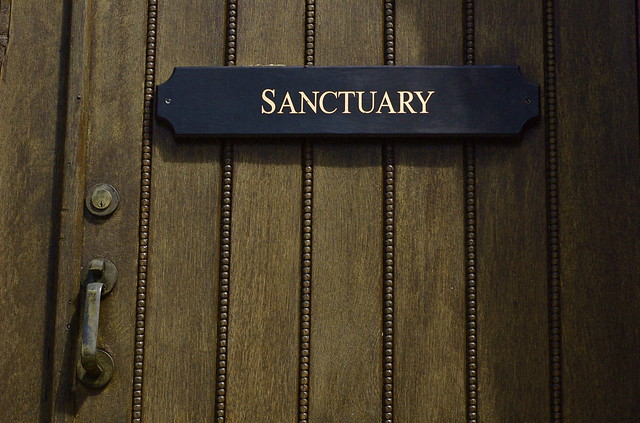Ever played a game as a child when you were being chased and had to get ‘home’ before you were caught? Sometimes ‘home’ would be a wall, a mat, a tent or a sofa. Whatever it was, you had to run between safe spaces while being chased. If you were caught you were ‘out’ and no longer part of the game. Or perhaps you became the chaser. One of the most exhilarating parts of the game was when you were nearing ‘home’ and there were the hands of your friends or siblings, waiting to pull you in and keep you safe.
Those childhood spaces we called ‘home’ can teach us something about what we call sanctuary or refuge, and the idea of sanctuary can be seen as a characteristic of a truly relational church based on kindness, friendship and care for the wellbeing of others. What if your church and your Christian community was the safest place you knew to be accepted for yourself in and with Christ?
A story
A woman came into a cathedral shop to browse. She didn’t buy anything but kept looking over at the candle stand. She really wanted to light a candle and say a prayer for someone but was too nervous to go out and do it. She used the shop as a halfway house to enter the main body of the cathedral. She felt she didn’t belong and might not be allowed. Eventually someone by the till noticed her longing and offered to go with her and pray alongside her.
In the same shop a young man came in asking for directions to a particular street. When told, he confided that he had hoped to stay with a friend, but the friend had moved house. He said that he could not go home. The shop staff found a member of the cathedral clergy to come and help and find the young person a safe place to stay.
Safety can be physical, mental, social, and spiritual. Cathedrals are often places of sanctuary, where people can come in for a break from the weather, their situation at work or home, or just to lay their needs before God. Many find the sense of silence and space deeply attractive and consoling.
Jesus is good at sending people home. Even when people he has healed, like the man called Legion, ask to stay at his feet, Jesus restores them to their own community, where they can tell their stories and testimonies to God’s goodness and where they can be part of their social situation. The lepers are healed from their disease but also from being outcast. The woman at the well goes back to her people to wonder at what the Lord has told her. And, perhaps most famously, the prodigal son goes home to his father and his family, to be welcomed, received back and given a feast of love.
It would be wonderful if our Church could celebrate that restoration of loving relationships, and enable those hovering on the edge to come in and find a home. Unfortunately, there are too many stories of people who find no sanctuary in their church, who are excluded, pushed out, or otherwise offered no sanctuary from a world which can hate and hurt them. Sometimes the home that Jesus sends them towards refuses to act as such. But a church that is truly relational, that is ever ready to welcome the person who has encountered Jesus, even the prodigal sons and former lepers, is one that anyone can call home.
Some things to do; ideas to ponder
- Do you think of your church or community of Christian friends as a home? What makes a church a place of sanctuary?
- Some people are always being ‘chased’. They might be chased by physical or mental illness, or by people who are bullying them, or literally chased by debt collectors, or by the results of their lifestyle or status. How can we build meaningful relationships with people with these problems and concerns and make a space that is a home for them?
- Imagine you were going to set up a refuge or a place of safety for a particular group of people. What would this refuge need to have in it to take care of them? How would you keep them safe from pursuers?
- Think about your own experience or have a look at some charities which provide refuge and places of safety. How do these provide for people and how are important are friendship and relationship to providing reassurance and comfort?



